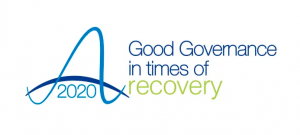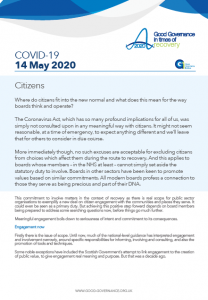Citizens
14 May 2020

Where do citizens fit into the new normal and what does this mean for the way boards think and operate?
The Coronavirus Act, which has so many profound implications for all of us, was simply not consulted upon in any meaningful way with citizens. It might not seem reasonable, at a time of emergency, to expect anything different and we’ll leave that for others to consider in due course.
More immediately though, no such excuses are acceptable for excluding citizens from choices which affect them during the route to recovery. And this applies to boards whose members – in the NHS at least – cannot simply set aside the statutory duty to involve. Boards in other sectors have been keen to promote values based on similar commitments. All modern boards profess a connection to those they serve as being precious and part of their DNA.
This commitment to involve matters in the context of recovery as there is real scope for public sector organisations to exemplify a new deal on citizen engagement with the communities and places they serve. It could even be seen as a primary duty. But achieving this positive step forward depends on board members being prepared to address some searching questions now, before things go much further.
Meaningful engagement boils down to seriousness of intent and commitment to its consequences.
Engagement now
Firstly there is the issue of scope. Until now, much of the national-level guidance has interpreted engagement and involvement narrowly, around specific responsibilities for informing, involving and consulting, and also the promotion of tools and techniques.
Some noble exceptions have included the Scottish Government’s attempt to link engagement to the creation of public value, to give engagement real meaning and purpose. But that was a decade ago.
Core questions for boards
In the absence of any consistent national leadership on engagement, it is up to every board – especially those that have autonomy, or are working in genuine partnership on place-based outcomes – to take the lead and agree for themselves convincing answers to three questions:
- What is our role in the urgent public conversation on what recovery really means?
- What do we know local citizens think constitutes meaningful engagement? And on what issues and in what ways do they expect to be actively engaged? (Is our data on this sound and up-to-date?)
- Notwithstanding what the public may want, how far are we prepared to truly embrace public engagement? Are we prepared to be directed by local communities, to shift power to their agendas and potentially away from the ones we or the government set?
These are really challenging questions but they’re essential to address when inequality has taken a leap backwards during lockdown. They press organisations on their levels of honesty and transparency about their role and impact – and on considering their legitimacy in acting on behalf of others with conviction.
Are they part of an establishment, engaging strictly within limits and retaining a level of paternalistic and determining control? Or do they live by a risk appetite that embraces citizens as potential disrupters and partners in achieving political change for local communities? These are not necessarily alternatives. However, the underlying ethos of each is different and board members need to be clear which applies and when.
A continuous approach
We know from our work with boards that many already have good narratives around engagement. Previous thinking on citizens may need stress-testing however, even for these more mature organisations, in light of the challenges to come and the credibility individual boards and systems will require for impact. It certainly requires board time to ensure the controlling mind is genuinely collective and attuned on this issue.
One focus for boards could be whether there is a well-articulated engagement strategy – crucially one that is continuous, comprehensive and permanent. Was that strategy shaped by stakeholders, citizens, staff and partners – and is there clear evidence that it is understood, owned and trusted?
More questions
There is a second set of more practical questions that also require the same degree of urgent consideration now, rather than in a few weeks’ time:
- Have we got our stakeholder mapping and support right for the new normal? (For example, do we need to recognise and even invest in some community organisations whose voices we need to hear but whose existence is precarious?)
- Do we need to increase the frequency and visibility of our engagement?
- Are we clear on the division of leadership responsibilities between non-executive and executive directors?
- Do we have an active digital platform that supports continuous engagement?
- Do we have the right levels of read-across between staff and citizen engagement, in terms of both guiding principles and practices?
A new deal
Much of the engagement to date has arguably been about marginal change to a status quo, in which organisations and their leaders, however hard they may protest, are heavily invested.
The so-called innovations that have been lauded as a positive outcome from the climate of national emergency are largely professionally-driven, modest and low-level, digitally-enabled changes in process.
Of course, the potential of digital technology extends far beyond this and boards would do well to consider the examples and prompts set out in our report Unleashing the Digital Premium as they develop their strategies for recovery.
Crucially, COVID-19-inspired innovations have not yet extended to enabling public engagement as a force for change. If we are to find a route to a sustainable reset, citizens need to be at the front and centre of both discourse and choice at a local level. Public sector boards would be well advised to demonstrate that they fully embrace engagement, participation and co-design.
Engagement and the board
Of course, citizen engagement does need to be approached with open eyes. It is messy and complicated territory.
However, we anticipate that excuses for maintaining the status quo, in terms of both outcomes and ownership, will not be well-received by many citizens, whose interest in public services seems more active than ever before.
A mobilised and active citizenry is entirely compatible with the principles of good governance, which see boards acting legitimately on behalf of others.
But the trick is where to draw the line for optimum outcomes. This decision is now a driving public necessity and boards have an obligation to address it directly.
At GGI we will be looking to help move this fundamental part of the future landscape forward in the weeks ahead, in any way we can.
We are keen to hear your views. If this briefing prompts any questions or comments, please call us on 07732 681120 or email us at advice@good-governance.org.uk. We will aim to respond within 24 hours.

